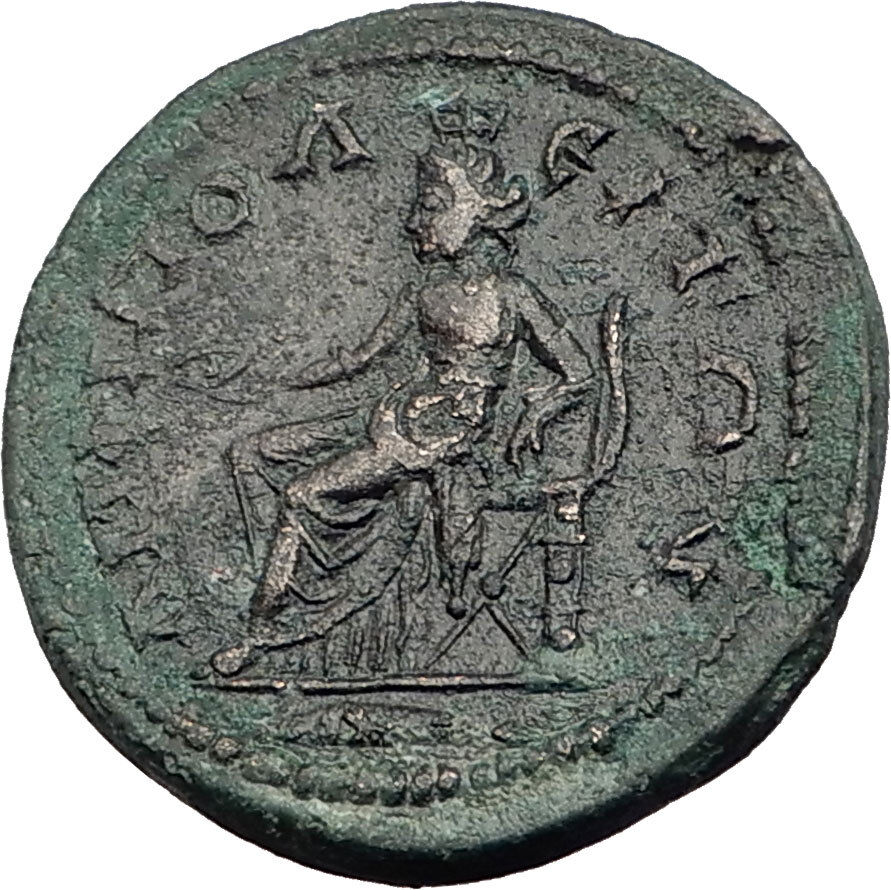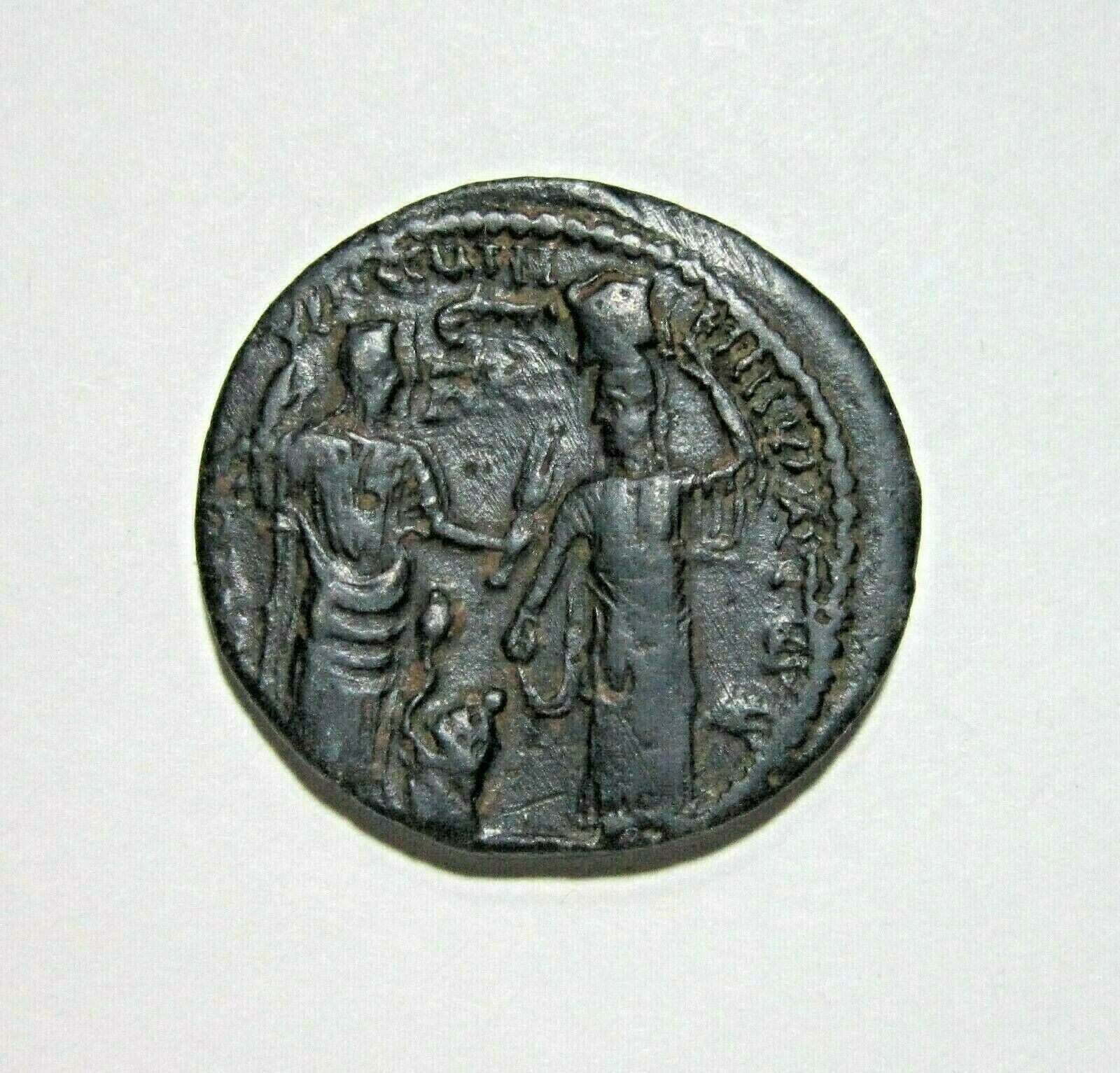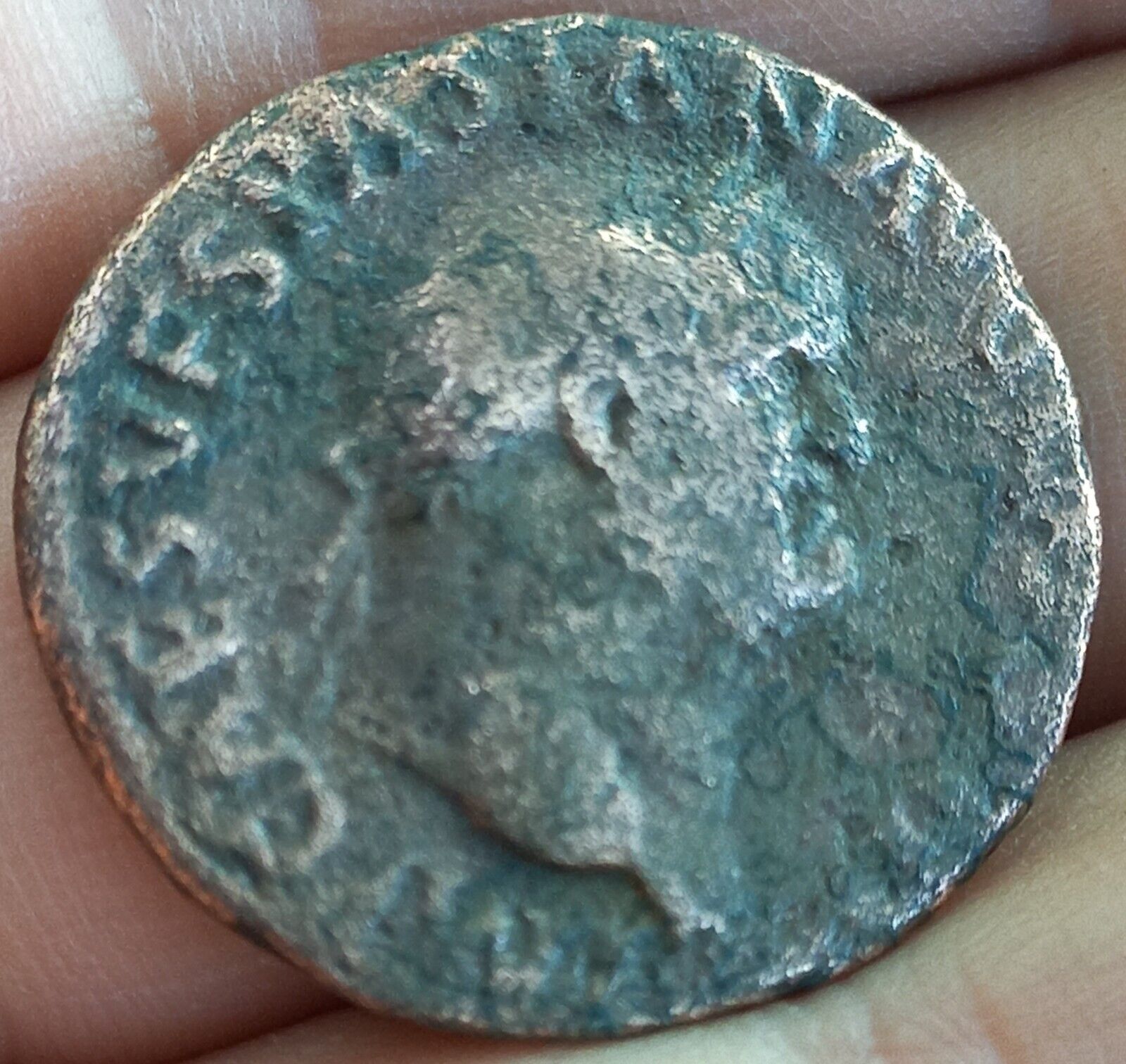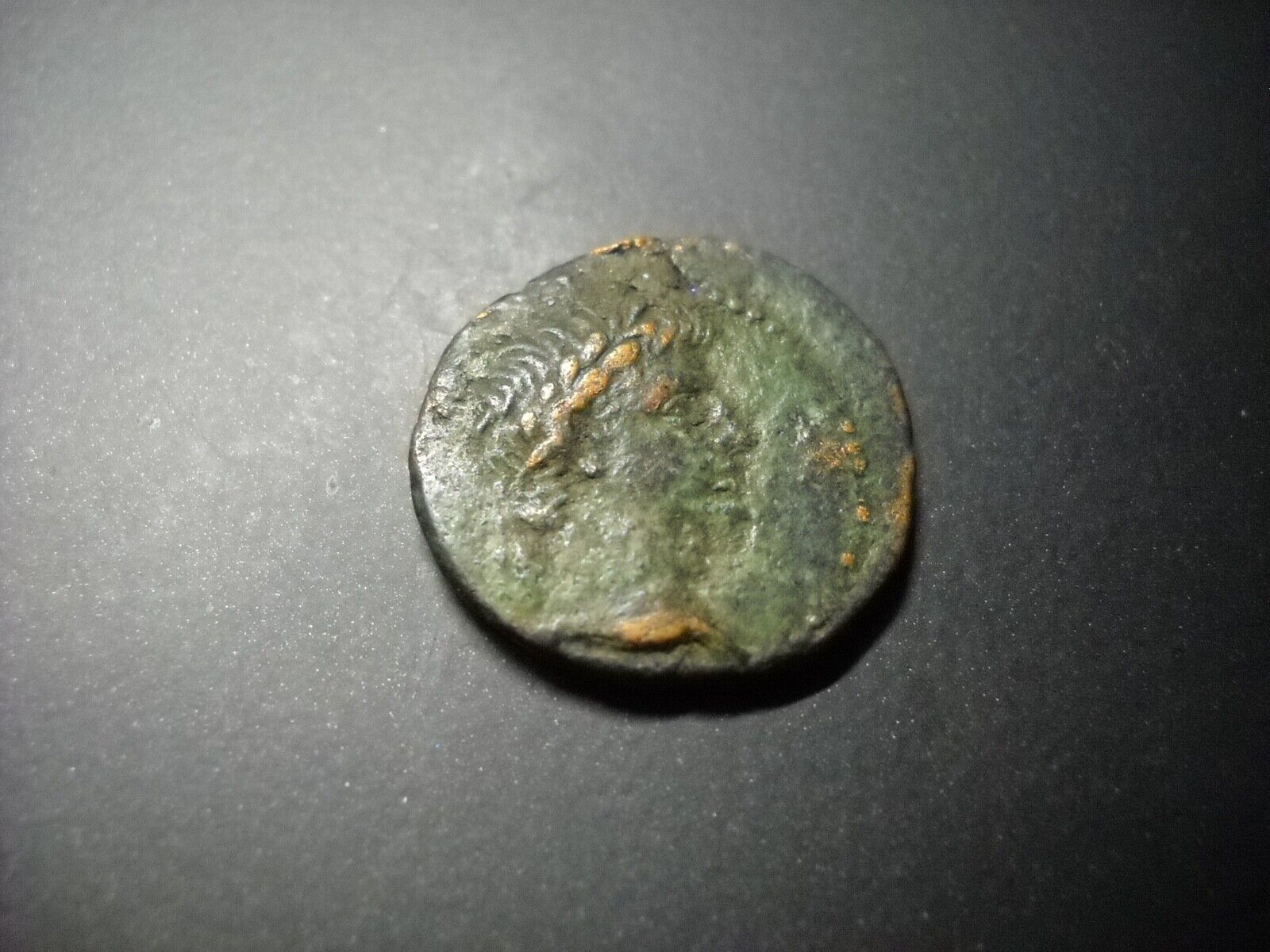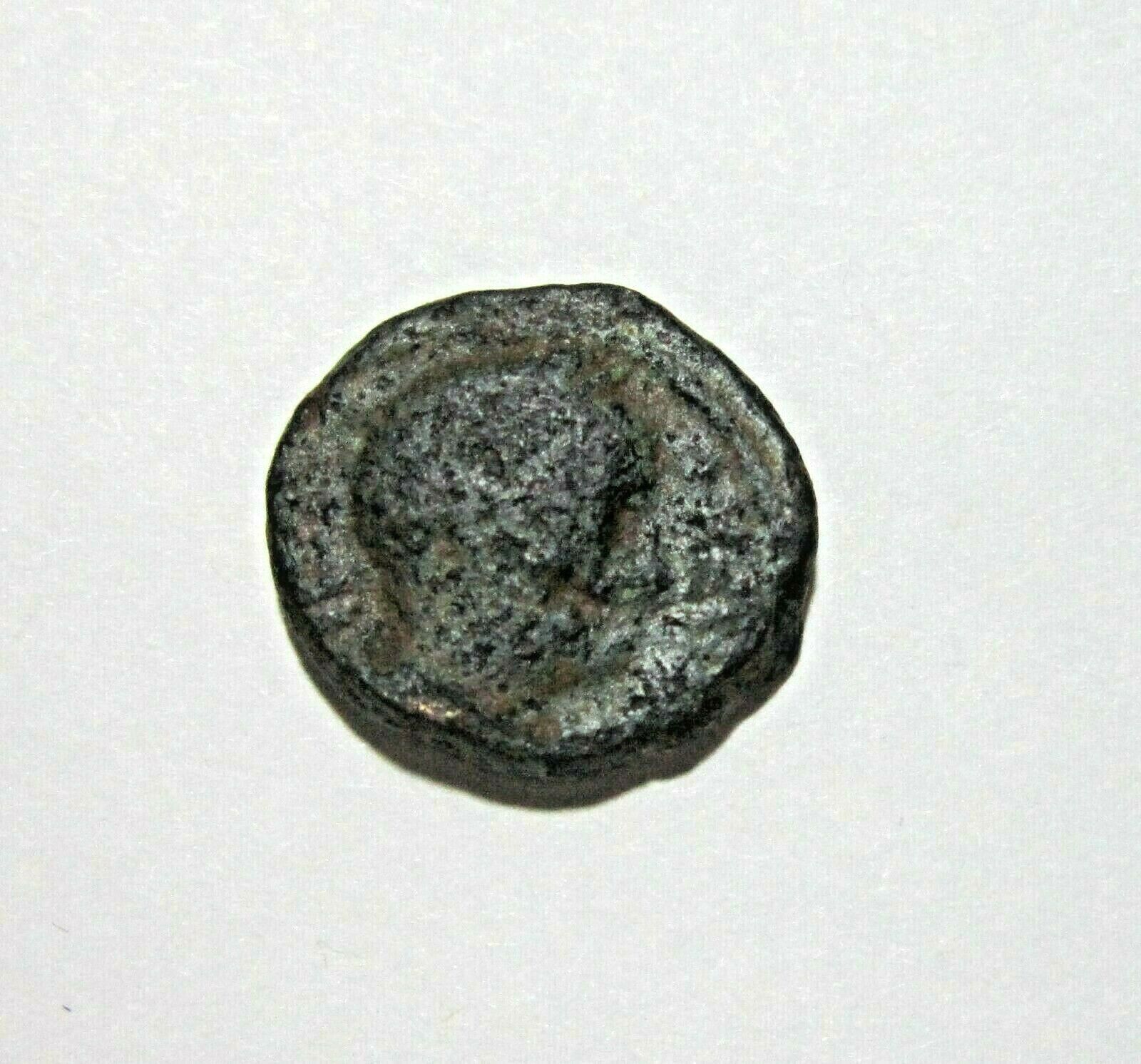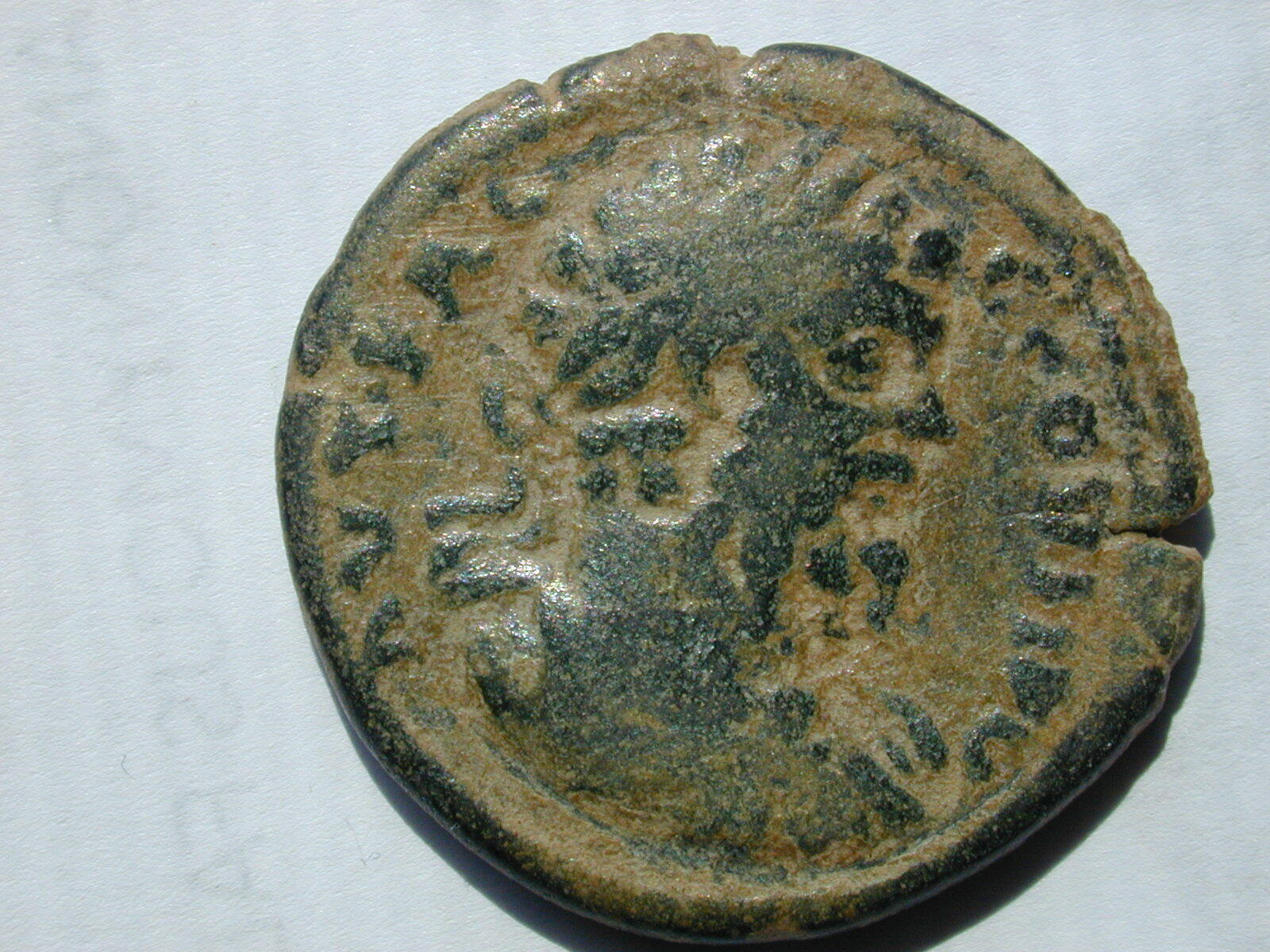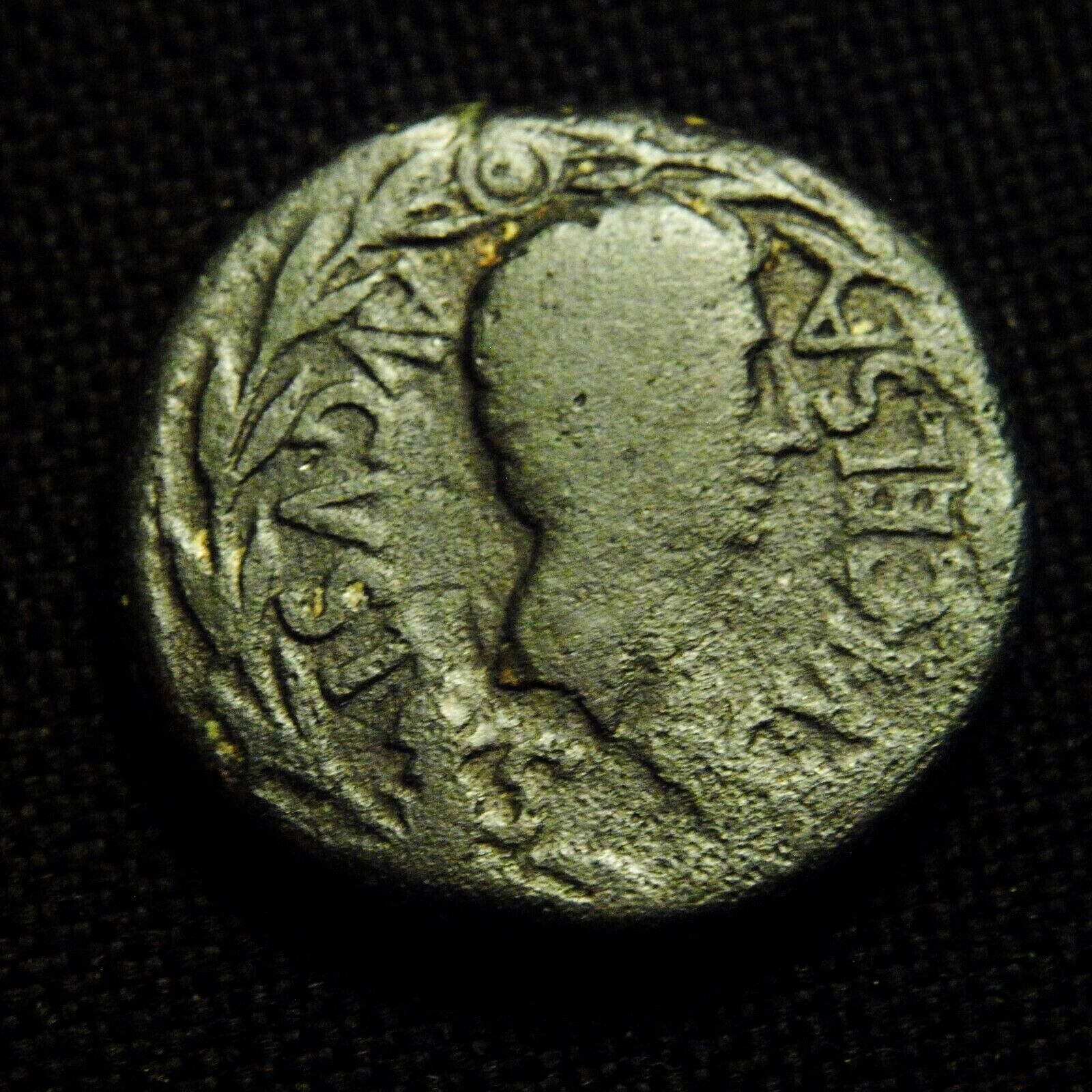-40%
SEPTIMIUS SEVERUS 193AD Marcianopolis SERAPIS Cerberus Ancient Roman Coin i50928
$ 110.88
- Description
- Size Guide
Description
Item:i50928
Authentic Ancient Coin of:
Septimius Severus
-
Roman Emperor
: 193-211 A.D. -
Bronze 27mm (14.56 grams) of
<="" font="" face="Times New Roman" color="#000000"> Marcianopolis in Moesia Inferior under Magistrate Julius Faustinianus
<="" font="" face="Times New Roman" color="#000000">
AV
Λ
C
ЄΠΤI
C
Є
VHPOC,
<="" font="" face="Times New Roman" color="#000000"> Laureate, draped and cuirassed bust right.
VΠ ΦAVCTINIANOV MAPKIANOΠOΛIT
ΩΝ
, Serapis enthroned left, holding scepter; Cerberus, the three headed dog of the underworld to left.
You are bidding on the exact item pictured, provided with a Certificate of Authenticity and Lifetime Guarantee of Authenticity.
Serapis
(Latin spelling, or
Sarapis
in Greek) was a
syncretic
Hellenistic
-
Egyptian
god in
Antiquity
. His most renowned temple was the
Serapeum of Alexandria
. Under
Ptolemy Soter
, efforts were made to integrate Egyptian religion with that of their Hellenic rulers. Ptolemy's policy was to find a deity that should win the reverence alike of both groups, despite the curses of the Egyptian priests against the gods of the previous foreign rulers (i.e
Set
who was lauded by the
Hyksos
).
Alexander the Great
had attempted to use
Amun
for this purpose, but he was more prominent in
Upper
Egypt
, and not as popular with those in
Lower Egypt
, where the Greeks had stronger influence. The Greeks had little respect for animal-headed figures, and so a Greek-style
anthromorphic
statue was chosen as the
idol
, and proclaimed as the equivalent of the highly popular
Apis
. It was named
Aser-hapi
(i.e.
Osiris-Apis
), which became
Serapis
, and was said to be
Osiris
in full, rather than just his
Ka
(life force). //
History
The earliest mention of a
Serapis
is in the disputed death scene of Alexander (323 BC). Here,
Serapis
has a temple at
Babylon
, and is of such importance that he alone is named as being consulted on behalf of the dying king. His presence in Babylon would radically alter perceptions of the mythologies of this era, though fortunately it has been discovered that the unconnected Babylonian god Ea (
Enki
) was titled
Serapsi
, meaning
king of the deep
, and it is possibly this Serapsi which is referred to in the diaries. The significance of this
Serapsi
in the Hellenic psyche, due to its involvement in Alexander's death, may have also contributed to the choice of
Osiris-Apis
as the chief Ptolemaic god.
According to
Plutarch
, Ptolemy stole the
cult statue
from
Sinope
, having been instructed in a dream by the
unknown god
, to bring the statue to
Alexandria
, where the statue was pronounced to be Serapis by two religious experts. One of the experts was of the
Eumolpidae
, the ancient family from whose members the
hierophant
of the
Eleusinian Mysteries
had been chosen since before history, and the other was the scholarly Egyptian priest
Manetho
, which gave weight to the judgement both for the
Egyptians
and the Greeks.
Plutarch may not however be correct, as some Egyptologists allege that the
Sinope
in the tale is really the hill of Sinopeion, a name given to the site of the already existing
Serapeum
at
Memphis
. Also, according to
Tacitus
, Serapis (i.e. Apis explicitly identified as Osiris in full) had been the god of the village of
Rhakotis
, before it suddenly expanded into the great capital of Alexandria.
The statue suitably depicted a figure resembling
Hades
or
Pluto
, both being kings of the Greek
underworld
, and was shown enthroned with the
modius
, a basket/grain-measure, on his head, since it was a Greek
symbol
for the land of the dead. He also held a
sceptre
in his hand indicating his rulership, with
Cerberus
, gatekeeper of the underworld, resting at his feet, and it also had what appeared to be a
serpent
at its base, fitting the Egyptian symbol of rulership, the
uraeus
.
With his (i.e. Osiris') wife
Isis
, and their son (at this point in history)
Horus
(in the form of
Harpocrates
), Serapis won an important place in the Greek world, reaching
Ancient Rome
, with
Anubis
being identified as Cerberus. In Rome, Serapis was worshiped in the
Iseum Campense
, the sanctuary of the goddess
Isis
located in the
Campus Martius
and built during the
Second Triumvirate
. The Roman cults of Isis and Serapis gained in popularity late in the first century thanks to the god's role in the miracles that the imperial usurper
Vespasian
experienced in the city of
Alexandria
, where he stayed prior to his return to Rome as emperor in
70 AD
. From the
Flavian Dynasty
on, Serapis sometimes appeared on imperial coinage with the reigning emperor. The great cult survived until 385, when a Christian mob destroyed the
Serapeum
of Alexandria, and subsequently the cult was forbidden by the
Theodosian decree
.
The early Alexandrian Christian community appears to have been rather syncretic in their worship of Serapis and Jesus and would prostrate themselves without distinction between the two. A letter inserted in the
Augustan History
, ascribed to the Emperor
Hadrian
, refers to the worship of Serapis by residents of Egypt who described themselves as
Christians
, and Christian worship by those claiming to worship Serapis, suggesting a great confusion of the cults and practices:
The land of Egypt, the praises of which you have been recounting to me, my dear Servianus, I have found to be wholly light-minded, unstable, and blown about by every breath of rumour. There those who worship Serapis are, in fact, Christians, and those who call themselves bishops of Christ are, in fact, devotees of Serapis. There is no chief of the Jewish
synagogue
, no
Samaritan
, no Christian
presbyter
, who is not an
astrologer
, a
soothsayer
, or an anointer. Even the
Patriarch
himself, when he comes to Egypt, is forced by some to worship Serapis, by others to worship Christ.
Marcianopolis
, or
Marcianople
was an ancient Roman city in
Thracia
. It was located at the site of modern day
Devnya
,
Bulgaria
.
The city was so renamed by Emperor
Trajan
after his sister
Ulpia Marciana
, and was previously known as Parthenopolis. Romans repulsed a
Gothic
attack to this town in
267
(or
268
), during the reign of
Gallienus
.
Diocletian
made it the capital of the
Moesia Secunda
province.
Valens
made it his winter quarters in 368 and succeeding years, Emperor
Justinian I
restored and fortified it. In 587, it was sacked by the king of the
Avars
but at once retaken by the Romans. The Roman army quartered there in 596 before crossing the Danube to assault the Avars.
Between 893 and 972 it was one of the most important medieval cities in south-eastern Europe.
L
ucius Septimius Severus
(or rarely
Severus I
) (April 11, 145/146-February 4, 211) was a
Roman
general, and
Roman Emperor
from April 14, 193 to 211. He was born in what is now the
Berber
part of Rome's historic
Africa Province
.
Septimius Severus was born and raised at
Leptis Magna
(modern
Berber
, southeast of
Carthage
, modern
Tunisia
). Severus came from a wealthy, distinguished family of
equestrian
rank. Severus was of
Italian
Roman ancestry on his mother's side and of
Punic
or
Libyan
-Punic ancestry on his father's. Little is known of his father,
Publius Septimius Geta
, who held no major political status but had two cousins who served as consuls under emperor
Antoninus Pius
. His mother, Fulvia Pia's family moved from
Italy
to
North Africa
and was of the
Fulvius
gens, an ancient and politically influential clan, which was originally of
plebeian
status. His siblings were a younger
Publius Septimius Geta
and Septimia Octavilla. Severus’s maternal cousin was
Praetorian Guard
and consul
Gaius Fulvius Plautianus
.
In 172, Severus was made a
Senator
by the then emperor
Marcus Aurelius
. In 187 he married secondly
Julia Domna
. In 190 Severus became
consul
, and in the following year received from the emperor
Commodus
(successor to Marcus Aurelius) the command of the
legions
in
Pannonia
.
On the murder of
Pertinax
by the troops in 193, they proclaimed Severus Emperor at
Carnuntum
, whereupon he hurried to Italy. The former emperor,
Didius Julianus
, was condemned to death by the Senate and killed, and Severus took possession of Rome without opposition.
The legions of
Syria
, however, had proclaimed
Pescennius Niger
emperor. At the same time, Severus felt it was reasonable to offer
Clodius Albinus
, the powerful governor of Britannia who had probably supported Didius against him, the rank of Caesar, which implied some claim to succession. With his rearguard safe, he moved to the East and crushed Niger's forces at the
Battle of Issus
. The following year was devoted to suppressing Mesopotamia and other Parthian vassals who had backed Niger. When afterwards Severus declared openly his son
Caracalla
as successor, Albinus was hailed emperor by his troops and moved to Gallia. Severus, after a short stay in Rome, moved northwards to meet him. On
February 19
,
197
, in the
Battle of Lugdunum
, with an army of 100,000 men, mostly composed of
Illyrian
,
Moesian
and
Dacian
legions, Severus defeated and killed Clodius Albinus, securing his full control over the Empire.
Emperor
Severus was at heart a
soldier
, and sought glory through military exploits. In 197 he waged a brief and successful war against the
Parthian Empire
in retaliation for the support given to Pescennius Niger. The Parthian capital
Ctesiphon
was sacked by the legions, and the northern half of
Mesopotamia
was restored to Rome.
His relations with the
Roman Senate
were never good. He was unpopular with them from the outset, having seized power with the help of the military, and he returned the sentiment. Severus ordered the execution of dozens of Senators on charges of corruption and
conspiracy
against him, replacing them with his own favorites.
He also disbanded the
Praetorian Guard
and replaced it with one of his own, made up of 50,000 loyal soldiers mainly camped at
Albanum
, near Rome (also probably to grant the emperor a kind of centralized reserve). During his reign the number of legions was also increased from 25/30 to 33. He also increased the number of auxiliary corps (
numerii
), many of these troops coming from the Eastern borders. Additionally the annual wage for a soldier was raised from 300 to 500
denarii
.
Although his actions turned Rome into a military
dictatorship
, he was popular with the citizens of Rome, having stamped out the rampant corruption of Commodus's reign. When he returned from his victory over the Parthians, he erected the
Arch of Septimius Severus
in Rome.
According to Cassius Dio, however, after 197 Severus fell heavily under the influence of his Praetorian Prefect,
Gaius Fulvius Plautianus
, who came to have almost total control of most branches of the imperial administration. Plautianus's daughter,
Fulvia Plautilla
, was married to Severus's son, Caracalla. Plautianus’s excessive power came to an end in 205, when he was denounced by the Emperor's dying brother and killed. The two following
praefecti
, including the jurist
Aemilius Papinianus
, received however even larger powers.
Campaigns in Caledonia (Scotland)
Starting from 208 Severus undertook a number of military actions in
Roman Britain
, reconstructing
Hadrian's Wall
and campaigning in
Scotland
.
He reached the area of the
Moray Firth
in his last campaign in Caledonia, as was called Scotland by the Romans.. In 210 obtained a peace with the
Picts
that lasted practically until the final withdrawal of the Roman legions from Britain, before falling severely ill in
Eboracum
(
York
).
Death
He is famously said to have given the advice to his sons: "Be harmonious, enrich the soldiers, and scorn all other men" before he died at Eboracum on
February 4
,
211
. Upon his death in 211, Severus was
deified
by the Senate and succeeded by his sons,
Caracalla
and
Geta
, who were advised by his wife
Julia Domna
. The stability Severus provided the Empire was soon gone under their reign.
Accomplishments and Record
Though his military expenditure was costly to the empire, Severus was the strong, able ruler that Rome needed at the time. He began a tradition of effective emperors elevated solely by the military. His policy of an expanded and better-rewarded army was criticized by his contemporary
Dio Cassius
and
Herodianus
: in particular, they pointed out the increasing burden (in the form of taxes and services) the civilian population had to bear to maintain the new army.
Severus was also distinguished for his buildings. Apart from the triumphal arch in the Roman Forum carrying his full name, he also built the
Septizodium
in Rome and enriched greatly his native city of
Leptis Magna
(including another triumphal arch on the occasion of his visit of 203).
Severus and Christianity
Christians were
persecuted
during the reign of Septimus Severus. Severus allowed the enforcement of policies already long-established, which meant that Roman authorities did not intentionally seek out Christians, but when people were accused of being Christians they could either curse
Jesus
and make an offering to
Roman gods
, or be executed. Furthermore, wishing to strengthen the peace by encouraging religious harmony through
syncretism
, Severus tried to limit the spread of the two quarrelsome groups who refused to yield to syncretism by outlawing
conversion
to Christianity or
Judaism
. Individual officials availed themselves of the laws to proceed with rigor against the Christians. Naturally the emperor, with his strict conception of law, did not hinder such partial persecution, which took place in
Egypt
and the
Thebaid
, as well as in
Africa proconsularis
and the East. Christian
martyrs
were numerous in
Alexandria
(cf.
Clement of Alexandria
,
Stromata
, ii. 20;
Eusebius
,
Church History
, V., xxvi., VI., i.). No less severe were the persecutions in Africa, which seem to have begun in 197 or 198 (cf.
Tertullian's
Ad martyres
), and included the Christians known in the
Roman martyrology
as the martyrs of
Madaura
. Probably in 202 or 203
Felicitas
and
Perpetua
suffered for their faith. Persecution again raged for a short time under the proconsul
Scapula
in 211, especially in
Numidia
and
Mauritania
. Later accounts of a
Gallic
persecution, especially at
Lyon
, are legendary. In general it may thus be said that the position of the Christians under Septimius Severus was the same as under the
Antonines
; but the law of this Emperor at least shows clearly that the
rescript
of
Trajan
[
clarification needed
]
had failed to execute its purpose.
="">="">="">
Frequently Asked Questions
How long until my order is shipped?
Depending on the volume of sales, it may take up to 5 business days for shipment of your order after the receipt of payment.
How will I know when the order was shipped?
After your order has shipped, you will be left positive feedback, and that date should be used as a basis of estimating an arrival date.
After you shipped the order, how long will the mail take?
USPS First Class mail takes about 3-5 business days to arrive in the U.S., international shipping times cannot be estimated as they vary from country to country. I am not responsible for any USPS delivery delays, especially for an international package.
What is a certificate of authenticity and what guarantees do you give that the item is authentic?
Each of the items sold here, is provided with a Certificate of Authenticity, and a Lifetime Guarantee of Authenticity, issued by a world-renowned numismatic and antique expert that has identified over 10000 ancient coins and has provided them with the same guarantee. You will be quite happy with what you get with the COA; a professional presentation of the coin, with all of the relevant information and a picture of the coin you saw in the listing.
Compared to other certification companies, the certificate of authenticity is a -50 value. So buy a coin today and own a piece of history, guaranteed.
Is there a money back guarantee?
I offer a 30 day unconditional money back guarantee. I stand behind my coins and would be willing to exchange your order for either store credit towards other coins, or refund, minus shipping expenses, within 30 days from the receipt of your order. My goal is to have the returning customers for a lifetime, and I am so sure in my coins, their authenticity, numismatic value and beauty, I can offer such a guarantee.
Is there a number I can call you with questions about my order?
You can contact me directly via ask seller a question and request my telephone number, or go to my About Me Page to get my contact information only in regards to items purchased on eBay.
When should I leave feedback?
Once you receive your order, please leave a positive. Please don't leave any negative feedbacks, as it happens many times that people rush to leave feedback before letting sufficient time for the order to arrive. Also, if you sent an email, make sure to check for my reply in your messages before claiming that you didn't receive a response. The matter of fact is that any issues can be resolved, as reputation is most important to me. My goal is to provide superior products and quality of service.




